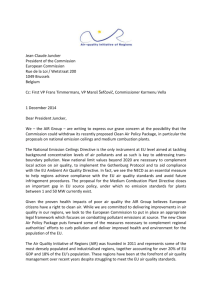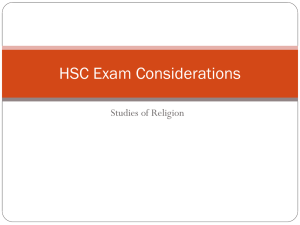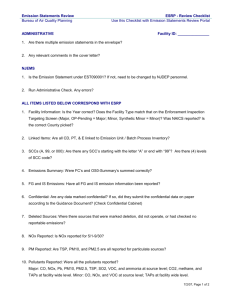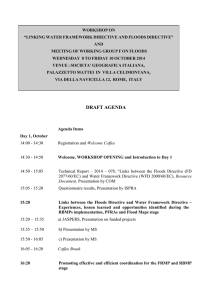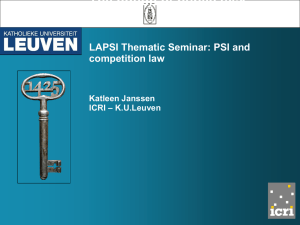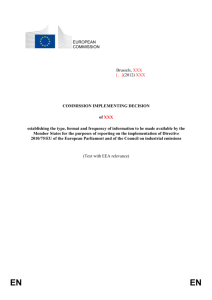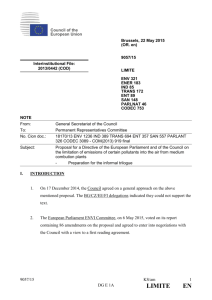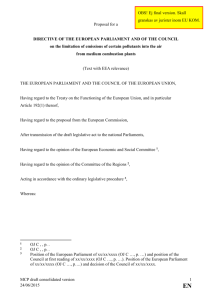With a view to the WPE meeting on 24 March, delegations will find in
advertisement
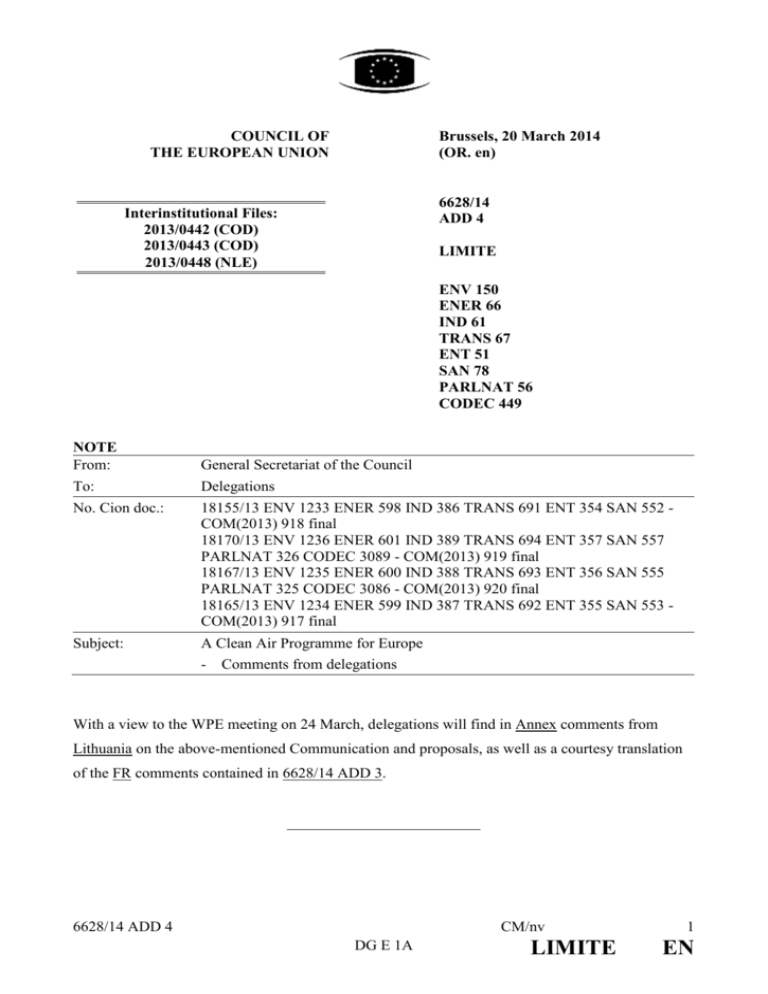
COUNCIL OF THE EUROPEAN UNION Brussels, 20 March 2014 (OR. en) 6628/14 ADD 4 Interinstitutional Files: 2013/0442 (COD) 2013/0443 (COD) 2013/0448 (NLE) LIMITE ENV 150 ENER 66 IND 61 TRANS 67 ENT 51 SAN 78 PARLNAT 56 CODEC 449 NOTE From: To: General Secretariat of the Council Delegations No. Cion doc.: 18155/13 ENV 1233 ENER 598 IND 386 TRANS 691 ENT 354 SAN 552 COM(2013) 918 final 18170/13 ENV 1236 ENER 601 IND 389 TRANS 694 ENT 357 SAN 557 PARLNAT 326 CODEC 3089 - COM(2013) 919 final 18167/13 ENV 1235 ENER 600 IND 388 TRANS 693 ENT 356 SAN 555 PARLNAT 325 CODEC 3086 - COM(2013) 920 final 18165/13 ENV 1234 ENER 599 IND 387 TRANS 692 ENT 355 SAN 553 COM(2013) 917 final Subject: A Clean Air Programme for Europe - Comments from delegations With a view to the WPE meeting on 24 March, delegations will find in Annex comments from Lithuania on the above-mentioned Communication and proposals, as well as a courtesy translation of the FR comments contained in 6628/14 ADD 3. _________________________ 6628/14 ADD 4 CM/nv DG E 1A LIMITE 1 EN ANNEX FRANCE Courtesy translation In full preparation for next WPEs on Air Package (March 24th and 25th), this note intends to answer the Presidency request on the reasons why France asks for the organization of one more WPE on the impact study. It does not however bear general French position regarding the directive on national emissions of certain atmospheric pollutants. This note also includes the French authorities’ position about the Directive on the limitation of emissions of certain pollutants into the air from medium combustion plants. French general position on subjects not mentioned below will be completed later on. A. Request for another WPE on the impact study - As other Member States, France has reservations on GAINS implementation and the last bilateral meeting between France and IIASA (2012 September the 6th) has shown French emissions were underestimated in many sectors. That is why France supports more discussions in the presence of all Member States rather than bilateral meetings, in order to better apprehend other Member States’ concerns. Regarding the directive on national emissions of certain atmospheric pollutants: - French authorities reaffirm their wish to know what specific measures were applied to France in the Commission implementation, be it about the reference year for emissions factors used or about the assumptions made regarding their implementation on French territory, especially for sulfur dioxide (SO2), ammonia (NH3) and methane (CH4); - France, just like the United Kingdom, requests a sensitivity analysis to know what would be the impacts on reachable targets if RDE were not aligned on EURO limit values (impact assessment page 31). Regarding the Directive on the limitation of emissions of certain pollutants into the air from medium combustion plants: - France wishes the chapter about MCP in the impact assessment were more developed and especially more detailed on best available technologies to implement in order to reach the emission limit values proposed. A deeper approach would have enabled a better assessment of compliance upgrade costs; - About the propositions made regarding combustion plants with a power between 1 and 5 MW, it is unfortunate that the impact assessment does not include a deep analysis of earnings associated with global air quality, all emission sources taken into account; - The impact assessment assumes 27% of the combustion plants will be renewed between 2018 and 2025. This means these plants have an average lifespan of about 26 years, which might seem a bit short for industrial material; 6628/14 ADD 4 CM/nv DG E 1A LIMITE 2 EN - B. Regarding the « mitigation measures » chapter, it is necessary to take into account zones that are not interconnected (Corse and overseas territories in France). These plants cannot use the same kind of fuel supplies and new mandatory abatement technologies are hardly worth considering both from a technical and economic point of view. Thus these plants should have specific emission limit values that are technically reachable, or time extension for compliance upgrade. Position regarding the Directive on the limitation of emissions of certain pollutants into the air from medium combustion plants: - French legislation on medium combustion plants was just revised taking into account technical, practical and cost efficient considerations, in order to set up the most relevant directions. It is essential that the upcoming European Directive also takes these aspects into account; - France is especially convinced there should be specific emission limit values according to the combustion plant size, with a more specific approach of fuel types than what has been done so far in the impact assessment; - There are more than 100 000 combustion plants with a power between 1 and 5 MW in the Member States, 13 000 of those being located in France. Gathering information required in the directive project for all 13 000 plants would imply an important administrative burden, with high costs associated. Therefore it seems better to first focus on the plants whose power is above 5MW and to let Member States the availability to define themselves the requirements on plants whose power is below 5MW. The latter might be concerned later, after assessment of the measures set up for plants whose power is above 5MW. ____________________ 6628/14 ADD 4 CM/nv DG E 1A LIMITE 3 EN LITHUANIA Preliminary comments on the proposal for a Directive of the European Parliament and of the Council on the reduction of national emissions of certain atmospheric pollutants and amending Directive 2003/35/EC (COM(2013) 920 final) (further – NEC directive) and on the proposal for a Directive of the European Parliament and of the Council on the limitation of emissions of certain pollutants into the air from medium combustion plants (COM(2013) 919 final) (further – MCP directive) General – Clean Air Policy Package The Clean Air Policy Package is awaited set of measures for further reduction of air pollution and negative effects on human health and ecosystems. Lithuania welcomes the priorities set out in The Clean Air Programme for Europe (CAP), in particular at this stage it is not intended to tighten the existing air quality requirements. We welcome the intention to strengthen air pollution control in the sectors, such as agriculture and medium combustion installations, whose contribution to the reduction of air pollution has been minimal so far. Roadmap In order to facilitate the works planning, it would be useful to have the Roadmap for the WPE Clean Air Package meetings therefore we would be grateful for his distribution to the Member States. With a reference to the proposals on NEC and MCP directives Lithuanian preliminary comments are as follows: 1. NEC directive NEC directive is the most important legislative instrument and raises the most difficult challenges. At this moment it is too early to comment the level of ambitions in the detail way. A sufficient time is needed to evaluate this proposal more deeply. Lithuania is at the initial stage of this evaluation. Anyway, Lithuania has some doubts regarding the obligations for 2030. The obligations largely depend on the MS’s energy consumption scenario. In our case it is still very unclear situation regarding the energy consumption projections for 2030. For example, we still not sure if the new nuclear power plant will operate in 2030, or not. However, nuclear energy is included in the energy consumption projections into the GAINS scenarios “2030-Commission Proposal” from the group of scenarios “TSAP_Dec2013”. Therefore, it is necessary to reconsider the scenario without the new nuclear power plant, respectively converting the proposed emission reductions for Lithuania. Taking into account this situation, we think that NEC directive needs to have certain provisions (or flexibility) providing MS to apply the obligations that correspond to factual situation. 6628/14 ADD 4 CM/nv DG E 1A LIMITE 4 EN We understand the need to ensure the air quality policy strategy links with the climate change mitigation, pollution reduction from agriculture. However, we have doubts regarding a dual regulation, which can be created by setting emission reduction target for one of the greenhouse gases - methane - for 2030 in NEC directive. Initial comments on NEC directive – – – – – 2. The processing of slurry and manure into biogas by fermentation method has a great significance to the reduction of ammonia (NH3) emissions. Therefore, we propose to supplement subparagraph IV of paragraph 4 (b) of Part I of Annex III, by method: “IV) the processing of slurry and manure into biogas, which are used for producing energy from biogas plants.”; Additional duties to monitor the effects of pollutant emissions will result in increasing administrative costs and the costs of research, analysis and data collection. It is important to determine the feasibility and added value of monitoring enlargement. Therefore, we propose to include a provision to paragraph 1 of Article 8: "Member States shall ensure the execution of monitoring, if is it possible and expedient". In order to provide an opportunity for the MS to choose the parameters of research and other provisions and how to implement them, taking into account local conditions, needs and expediency, respectively we propose to adjust 1 and 2 paragraphs of Annex V; Article 7 para, 2 requires to prepare and update every two (instead of the existing reporting period - once in five years) years spatially disaggregated emission inventories, large point source inventories and emission projections for the pollutants. The frequency of reporting is also set in newly approved guidelines for reporting under CLRTAP requirements (once in four years). In order to ensure the compatibility, we propose to adjust paragraph 2 of Article 7, by changing the frequency of reporting to every four years; The period for transposition needs to be extended (from 18 to 24 months); The content of the annexes constitute an essential element of the act, so annexes should be amended by a legislative act, not by delegated act. MCP directive Lithuania agrees that at the EU level we need to regulate the medium-size (1-50MW) combustion plants. This regulation would contribute to solving the air quality problems relating with biomass. On the other hand the implementation of new requirements will require substantial additional funds. We support the registration of medium combustion plants, however the emission limit values set for medium combustion plants and the terms of entry into force are the objects that need further discussions. We propose to include the following provisions and clarifications to MCP directive: - Clarify the definition of “combustion plan”. Does it mean an individual boiler, or a group of boilers connected to a single stack? MCP directive should be supplemented by aggregation rules (as in Article 29 of Directive 2010/75/EU), if the combustion plant is a group of boilers. Detailed interpretation is necessary; 6628/14 ADD 4 CM/nv DG E 1A LIMITE 5 EN – The revision of the emission requirements for medium combustion plants. They should not be set at the same level for all plants within the thermal input range of 1-50 MW; Introduce limited life time derogation for medium combustion plants (for instance, 20 000 operating hours for a certain period, as in Article 33 of Directive 2010/75/EU) The period for transposition needs to be extended (from 18 to 24 months). 6628/14 ADD 4 CM/nv DG E 1A LIMITE 6 EN
